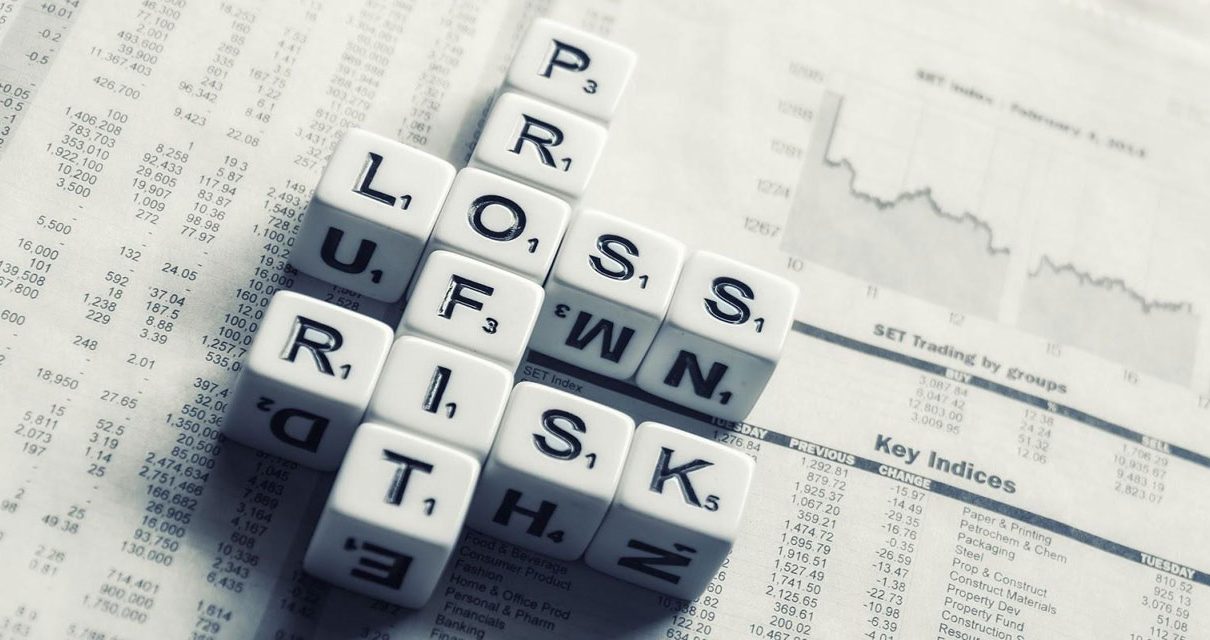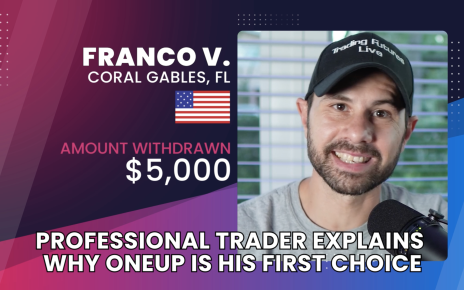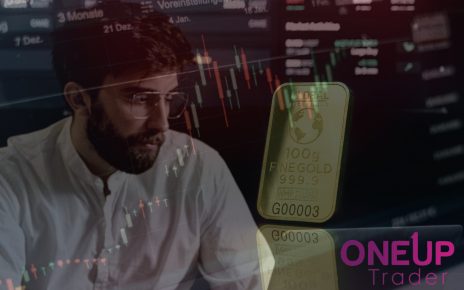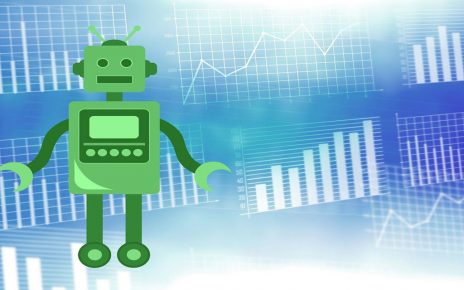As beginner investors, it is necessary to get into market research, reviews, and decide what kind of active trader you will be, how you will analyze the market, what strategies you will implement in your trading platform, and what tools you will use to reach your trading goals.
Luckily, the financial world offers a number of opportunities you can choose and experiment with while online trading. One of these is a trading platform, which is key because its features and tools should complement your needs.
In this article, we have gathered all of the information about trading platforms and active traders. Here you will find what you need to know on how to choose one, different types, important features, and more day trading basics with online brokers.
Watch the Interview with Gil Y. a funded trader who just made a withdrawal of $10k!
What is a trading platform?
A trading platform is a trading software that has been created so individuals can access the markets, open and close market positions, and manage portfolios. Platforms are offered by brokers that act as a financial intermediary between you and the securities exchange. Brokers are third party companies that also offer customer service, education, investment advice, research, stocks, and more.
The platform will provide different features that might or might not work with your trading strategy. Some of these are e-trade, options trades, charting software, news feeds, advisory services, alerts, customizable interfaces, and other products.
Platforms can be either a web platform, desktop platform, or downloadable app.
How to get a trading platform as a futures day trader
If you are planning on choosing your trading platform, it is essential to find a broker that offers the software you need and open a brokerage account.
Another of the many choices is a funded trader program. Here, you can trade with less risk since you will be placing market orders using the company’s funds to trade assets such as exchange traded funds (ETFs), stocks, futures or options.
Here, you will work with two different desktop platforms. As you go through the examination process you will trade on a platform that offers virtual money and real-time quotes so you can practice.
Once you pass the test, you will reach the trading platform with real funds. On this platform, you will have to follow a few rules like maximum loss, risk management tools, leverage, options trading, and more.
If you have enough funds and can respond to possible losses, then you can also sign up for a broker as an individual trader or investor. They will also offer different platforms that could have been created by them or be a well-known software.

Types of trading platforms
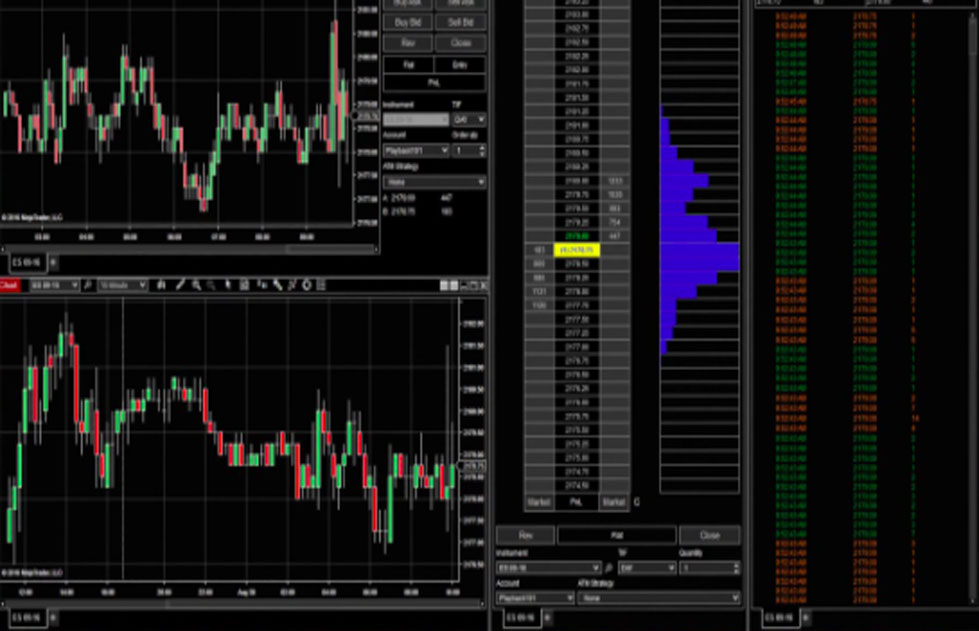
There are two types: commercial platforms and proprietary trading platforms.
Commercial platforms’ objective is to work with retail investors or day traders. A retail investor is an individual that buys and sells securities products as a non-professional. A day trader opens and closes various trades throughout the day.
On the other hand, a proprietary trading platform is when a financial firm invests its funds in the trading industry. To do this, they might require funded traders to trade on behalf of the company which has certain rules per contract.
Both day trading platforms and proprietary platforms can offer demo platforms. This means that you can trade paper money with real-time quotes. It is helpful if you want to try out a new strategy or practice before entering the real market.
What makes trading platforms good?

Below we have included a list with a short explanation of online trading platforms characteristics, tools, and customer support you might want to look for to have a good overall trading experience when opening day trades.
Read: Social Trading and the Problems of Being a Lone Trader
Tradable instruments for day trading
Are you looking for day trading or invest in a single instrument? Do you want a diversified portfolio through online brokers or an investment advisor?
According to your demands, you might want day trading platforms for bonds, options trades, futures contracts, stocks, or commodities like oil, gold, beef, pork, coffee beans, grains, natural gas, wheat, silver, copper, and more.
Maybe you would rather invest in e-trade like cryptos, ETF trades, indices, or major, minor and exotic forex pairs. Look for a platform that gives you access to a market that offers the liquidity you like.
Charts
Charts are crucial when it comes to taking a decision and observing data points. They are part of the review process for market prices. It is important to analyze a chart before speculating.
Some of the things you can look at are trend lines, support and resistance levels, and performance. There are good charts with clear market data on Yahoo Finance.
However, there are many types of charts you can read. One of the most popular is the Japanese Candlestick. It is world known for identifying patterns on a chart to analyze the price movement and hopefully speculate about the future.
You can also find line charts, a very basic option with a simple view. Additionally, there are high low close bar, point and figure, volume charts, and many others.
Licencing
A broker and a platform with a license is one of the first things you must ensure. A licensed platform guarantees to protect your best interest as a client and as a trader. This creates fidelity.
A licensed platform will be watched over by the financial authority it is registered in. Your money will be safe from bankruptcy and they will make sure you are not exposed to excessive risk. For example, there are leverage, deposit, withdrawal, and funding rules.
Fees and commissions
Trading platforms earn money through the fees, order flow, and commissions they charge their clients. These fees will vary according to each platform and its tools. Remember to keep in mind your trading decisions.
Some fees traders should look at are the ones charged when you deposit or withdraw. There are funding methods like credit cards, debit cards, bank wire transfers, checks, and epayments. Each of these might have a different fee, and possibly a minimum withdrawal or deposit amount.
There might be an account minimum. Also, other common expenses included in brokerage accounts are inactivity fees. However, pattern day traders mustn’t worry about these fees if they are constantly short selling.
Conversion fees per trade are also frequent. Make sure you know what your base currency is. Lastly, see if your trading platform charges investors any commissions for account maintenance.
It is necessary to understand how these costs can affect or benefit you according to your trading strategy. For example, if you are a day trader a 0 pip spread platform could be right for you.
A spread is the difference between the ask and the bid price per trade, so if you are opening and closing numerous trades in one day, the spread will add up.
Conclusion – Active traders and trading platforms

Whether you are looking for the best futures trading platform, day trading platform, or proprietary trading platform, it is important to research reviews.
Learning is part of making successful trades. A good website to look at is stockbrokers.com for the best online brokers with exchange traded funds ETFs or stocks.
Knowledge will help your investment decision in such a way that your risk will be minimized and your gains maximized whether per contract or as day traders.
A trading career is full of milestones and experience that comes from both mistakes and success. Trading with calm emotions will also help you create a better future along with using tools.
Reference and bibliography used for this article
- https://www.fxempire.com/education/article/what-to-look-for-when-choosing-a-trading-platform-409345 by FX Empire
- https://www.investopedia.com/terms/t/trading-platform.asp#:~:text=Platforms%20may%20also%20be%20specifically,day%20traders%20and%20retail%20investors by Investopedia.
- https://www.liberatedstocktrader.com/compare-stock-chart-types/ by Liberated Stock Trader


